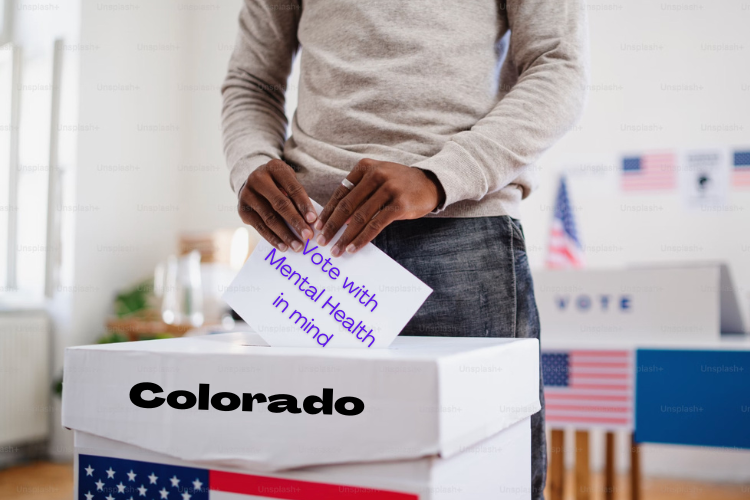By Vincent Atchity, Mental Health Colorado
Voters urged to focus on candidates' mental health policies as 25% of adults and 20% of youth struggle in Colorado
As we approach November, Colorado remains in the throes of a mental health crisis. According to recent statistics, over one in four Colorado adults are experiencing a mental illness — one of the highest rates in the nation. Our kids are feeling this too. Over one in five Colorado kids experienced a major depressive episode in the last year. This election offers a crucial opportunity to take an active role in advocating for the needs of our communities and helping to shape how our state prioritizes greater health and well-being for all of us.
Coloradans aren’t just choosing who to elect for President and who to send to Congress in 2024. We’re also electing state legislators, county commissioners, district attorneys and other municipal officials, as well as deciding on some critical ballot measures that could have a huge impact on the well-being of our communities.
The lead-up to the election is itself taking a toll on our mental health, but the act of marking and returning our ballots as we exercise our right to vote can be good medicine. In the coming weeks, all Coloradans will have the power and opportunity to prioritize and take small steps toward improved health and well-being — by filling in ovals purposefully all the way down our ballots.
Here are some critical questions you can ask candidates at every level of government to determine their commitment to improving the health and well-being of our communities:
- What will you do to support the best possible health outcomes and experience of well-being for the young? And for the aging and old?
- How will you work to expand access to mental health support for your constituents, including immediate access to mental health services for those in crisis?
- Are you in favor of local policies and practices that create pathways to health, rather than toward criminalization and incarceration, for people with mental health and substance use conditions, such as the diversion program Colorado lawmakers passed in 2024?
These questions are essential for understanding how candidates plan to keep human health and well-being at the top of mind in every area of public decision-making. It’s important to remember that pro-human public policies aren’t just about directly improving access to health care, supports and services. To create a healthier Colorado, we also must ensure everyone can access housing, live free from discrimination, earn enough to provide for themselves and their families to be proud taxpayers and feel a sense of value and purpose within their communities.
Election season is a fraught time for many of us. Heightened political rhetoric and a pervasive climate of division can take a toll on our sense of well-being and leave us feeling dissatisfied, angry, and helpless. Anxiety and fear of what the future brings can feel overwhelming.
So remember this: the act of voting itself is a powerful tool for feeling a little bit better. By making a plan to vote and researching candidates and ballot issues, we perform a sacred civic duty. We exercise responsibility and cultivate a sense of empowerment. We affirm that we have come of age and can be trusted to be wise enough to participate in how we are governed. Engaging in the democratic process reinforces the fact that our voices matter and that we can effect change. And by focusing on voting, we focus on what we can control — an age-old craft for making improvements while alleviating anxiety, helplessness, and despair.
This November, let’s educate ourselves, engage in our democracy, and cast our votes with mental health in mind. Together, we can pave the way for a healthier Colorado, where everyone has access to the support they need to thrive. Your vote is your voice — let it be heard loud and clear for the sake of our well-being.
Vincent Atchity is president and chief executive of Mental Health Colorado. He advocates for public health and health equity, has worked to disentangle mental health and criminal justice by leading the Equitas Project and has served on the Colorado Governor’s Behavioral Health Task Force and Behavioral Health Transformational Task Force.


